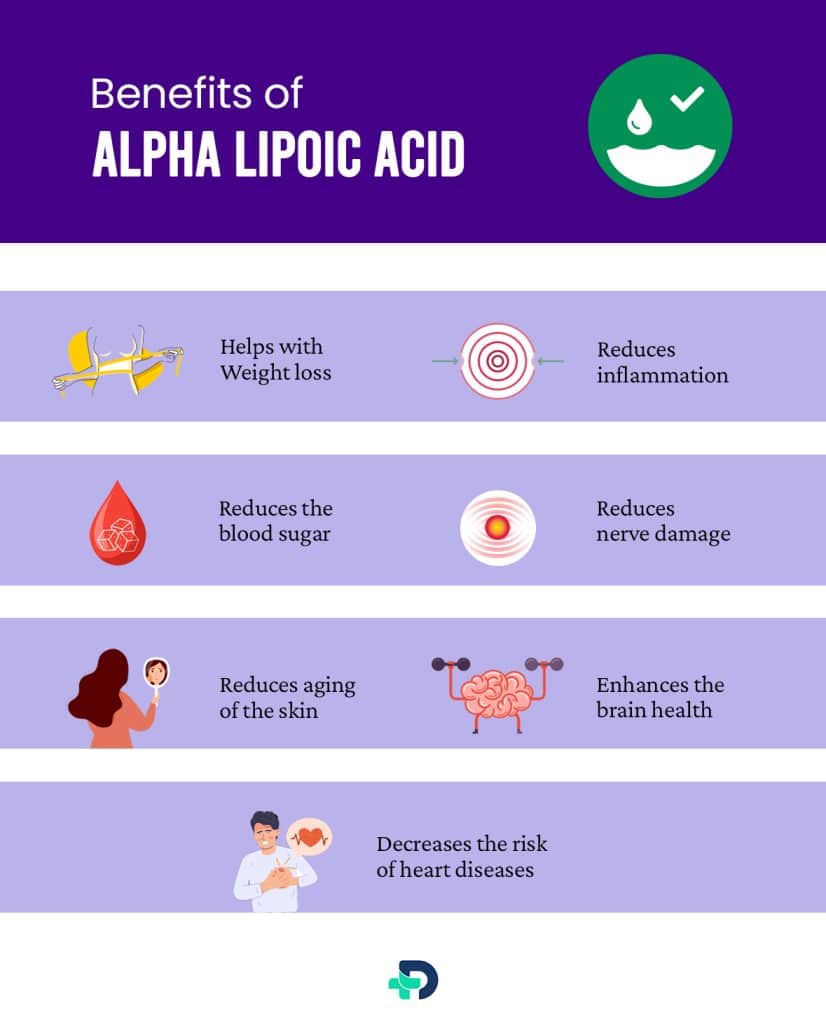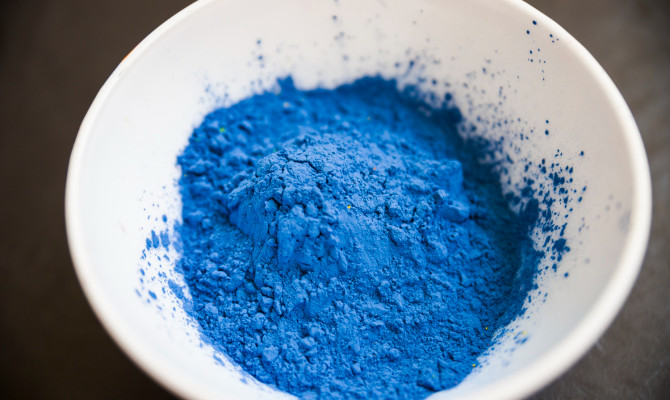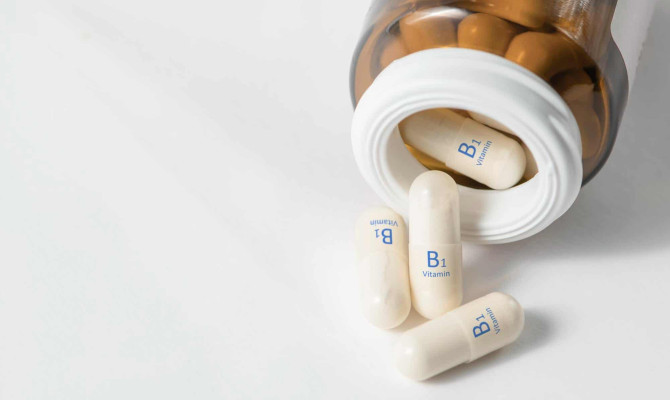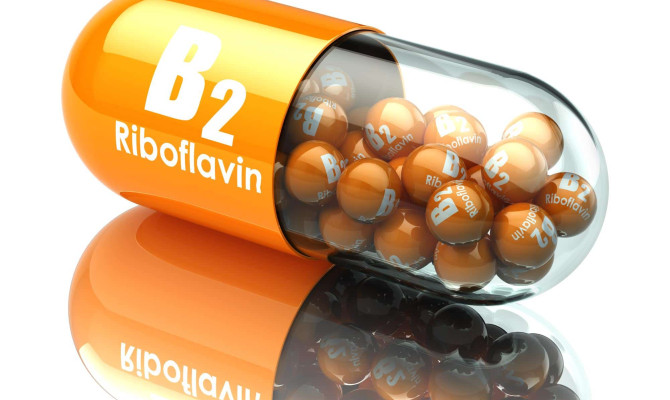Health Benefits of Alpha-Lipoic Acid

- Alpha-Lipoic Acid
- 16 Aug 2023
Overview
What is Alpha lipoic acid?
Alpha lipoic acid is a natural fatty acid made by our body and is a powerful antioxidant.
Alpha lipoic acid is essential for digestion, assimilation (absorption), and energy generation and assists enzymes in transforming food into energy. Alpha lipoic acid is produced in our body in tiny amounts, but one can get it by consuming various food sources.1Overview| Researched based study from Nlm.nih.gov

Key Facts of Alpha lipoic acid
- Alpha lipoic acid is also known as lipoic acid, lipoate, and thioctic acid.
- Alpha lipoic acid is produce in the mitochondria of our cell Mitochondria are a compartment in the cell responsible for converting our consumed food into energy that our cells can utilize.
- It is water- and fat-soluble and works in every cell or tissue of our body.
- Alpha lipoic acid is available as a dietary supplement in some countries and as a drug in others. it has recently gained attention due to its multiple health benefits1Overview| Researched based study from Nlm.nih.gov
Sources
Sources of Alpha lipoic acid
Plant sources
- Spinach
- Broccoli
- Brussel sprouts
- Potatoes
- Tomatoes
- Green Peas
- Beets
- Carrots
- Yams
- Rice bran
Animal Sources
- Red meats
- Organ meats such as heart, liver, kidney
- Brewer’s yeast 2Sources| Researched based study from Nlm.nih.gov
Dosage
Dosage of Alpha lipoic acid
The recommended daily dose of alpha lipoic acid is as follows
- Adults(for general health)-20-50 mg(milligrams)
- Adults(for antioxidant purposes)-50-100 mg
- Adults (with diabetes)-600-800 mg
- Adults(with diabetes neuropathy(nerve damage))-600-1800mg
However, it is best to consult a health care professional to know the correct dose of alpha lipoic acid suitable for one’s health 3Dosage| Researched based study from Nlm.nih.gov
Different dosage forms of Alpha lipoic acid
Alpha lipoic acid is available commercially in different forms, like
- Tablet form
- Capsule form
- Injection form
- Ointment
What is the right time to take Alpha lipoic acid Supplements?
- Oral intake of Alpha lipoic acid immediately after a meal decreases the supplement’s absorption. So, for best results, physicians often recommend taking it early morning on an empty stomach, one hour before or one hour after food.
Benefits

Benefits of Alpha lipoic acid
Alpha lipoic acid binds to harmful substances in our bodies that destroy our cells and prevent DNA damage. It assists several vital mitochondrial enzymes in the cells to take up glucose. It also helps in regulating the signaling molecules and transcription factors 4Benefits| Researched based study from Nlm.nih.gov
Health benefits of Alpha lipoic acid
Alpha lipoic acid has numerous health benefits, such as
- Helps with Weight loss
- Reduces the blood sugar
- Reduces aging of the skin
- Reduces inflammation
- Reduces nerve damage
- Enhances the brain health
- Supports the proper functioning of nerves
- Decreases the risk of heart diseases
Helps with Weight loss
- Alpha lipoic acid suppresses the enzyme AMP-activated protein kinase, suppressing AMP-activated protein kinase allows one to feel less hungry and burn more calories while at rest 5Benefits| Researched based study from Nlm.nih.gov
However, further studies are warranted on humans to prove the effect of Alpha lipoic acid on weight loss.
Reduces the blood sugar
- Alpha lipoic acid lowers the blood sugar in diabetic individuals
- It decreases the insulin resistance. Insulin resistance is when the body cells do not respond to insulin and can’t use the glucose in the blood to provide energy.
- It lowers the risk of diabetes complications such as kidney, nerve, and eye damage 6Benefits| Researched based study from Nlm.nih.gov
Reduces the skin aging
- Alpha lipoic acid cream application decreased skin wrinkles and roughness associated with aging.
- It protects the skin from the sun’s harmful ultraviolet radiation
- It protects the body against skin damages 7Benefits| Researched based study from Nlm.nih.gov
Reduces inflammation
- Alpha lipoic acid reduces C-reactive protein levels in individuals with chronic diseases such as diabetes and cancer.
- It reduces redness, swelling, and pain 8Benefits| Researched based study from Nlm.nih.gov
Reduces nerve damage
- Alpha lipoic acids help in healthy nerve functioning
- It improves the nerve pain associated with diabetic nephropathy
- It also slowed the progression of carpal tunnel syndrome9Benefits| Researched based study from Nlm.nih.gov Carpal tunnel syndrome is a disease characterized by compression of one of the nerves leading to loss of sensation and tingling pain in the affected part
Enhances the brain health
- Alpha lipoic acids slow the progression of Alzheimer’s disease
- It also improved the mental ability of Alzheimer’s patients 10Benefits| Researched based study from Nlm.nih.gov
Helps proper nerve functioning
- Alpha lipoic acid destroys the free radicals that cause nerve damage
- It reduced the tingling sensation in diabetic nephropathy patients 12Benefits| Researched based study from Nlm.nih.gov Diabetic nephropathy is a kidney disease associated with persistent diabetic patients
Decreases the risk of heart diseases
- Alpha lipoic acids nullify the free radicals and prevent cell destruction, thereby reducing the risk of heart disease.
- It lowers the low-density lipoprotein (bad cholesterol) level in the body.
- It improved the conditions in patients with endothelial dysfunction 11Benefits| Researched based study from Nlm.nih.gov
Side effects
Side effects of Alpha lipoic acid
Alpha lipoic acid is generally safe for most people when taken orally at the correct dose. However, some people might experience the following side effects:
- Headache
- Lightheadedness
- Heartburn
- Abdominal problem
- Nausea and vomiting
- Skin rash
- Hives
- Swelling in the face, throat, lips, and tongue
- Difficult breathing
- Extreme tiredness
- Anxiety
- Difficulty in sleeping
- Low blood pressure
- Diarrhea 13Side effects| Researched based study from Nlm.nih.gov
Overdose
Overdose toxicity of Alpha lipoic acid
- Rapid heart rate
- Too much acid build up in the blood(metabolic acidosis)
- Convulsions (body shaking)
- Fainting
- Mental problem
- Multiple organ failure 14Overdose| Researched based study from Nlm.nih.gov
Deficiency
Alpha lipoic acid deficiency
Alpha lipoic acid deficiency causes a rare metabolic disease called lipoic acid synthetase deficiency. Lipoic acid synthetase deficiency affects the mitochondria present in the body’s cells.
Symptoms of Alpha lipoic acid deficiency are
- Seizures
- Feeding difficulties
- Problems in muscular growth
- Decreased movement
- Slowed speech
- Mental problem 15Deficiency| Researched based study from Nlm.nih.gov
Who are at risk of deficiency?
- People with diabetes( high blood sugar)
- One with liver diseases
- One with thyroid problems
- People with vitamin B deficiency
- People with alcoholism( addicted to alcohol)
- One under two weeks after surgical operation
- People allergic to alpha-lipoic acid or any component of the medication 16Deficiency| Researched based study from Nlm.nih.gov
Precautions
Precautions of Alpha lipoic acid
- Nursing mothers, pregnant women, and children should avoid using alpha-lipoic acid due to the lack of safety and efficiency in these groups.
- It is always best to speak to a healthcare professional if the necessity of taking alpha-lipoic acid arises in such groups.
Interactions
Interactions of alpha lipoic acid
Antidiabetic medication (Blood sugar lowering medication)
- Alpha lipoic acid lowers the blood sugar
- Taking alpha lipoic acid and antidiabetic medication together might lower the blood sugar causing sweating, lightheadedness, and confusion.
Anticancer medication
- Taking alpha lipoic acid and anticancer medication, such as alkylating agents, might decrease the drug’s efficiency.
Antitumor antibiotics
- Antitumor antibiotics are an anticancer medicine to block the growth of cancer cells.
- Taking alpha lipoic acid and antitumor antibiotics might decrease the drug’s efficiency.
Thyroid medication
- Taking alpha lipoic acid and thyroid medication together might decrease the blood levels of the drug. It might decrease the drug’s effectiveness
Blood thinning medication (Anticoagulants)
- Alpha lipoic acid lowers the blood clotting process
- Taking alpha lipoic acid and blood thinning medication together might increase the risk of profuse bleeding 17Interactions| Researched based study from Nlm.nih.gov
Foods to avoid while taking alpha lipoic acid
- Garlic
- Fenugreek
- Panax Ginseng
- Siberian Ginseng
- Horse chestnut
- Psyllium
- Guar gum
Storage
Storage of alpha lipoic acid
- One should keep it in a cool and dry place
- Keep it away from direct sunlight
- Keep it out of reach of children and young kids
Takeaway
Key Takeaways
- Alpha-lipoic acid is a natural antioxidant compound in the body in minute amounts.
- One can get Alpha-lipoic acid from various natural food sources and supplements.
- Research has proven its benefit for various health conditions such as diabetes, weight loss, and memory problem.
- Alpha-lipoic acid is generally well tolerated by most adults
- It is always best to take medical advice before including Alpha-lipoic acid in one’s diet to get the correct dose and avoid the drug’s complications.
Any feedback on this article?
 This Articles content was accurate
This Articles content was accurate Very Informative Article
Very Informative Article I have a question or a comment
I have a question or a comment
 This article contains inaccurate content
This article contains inaccurate content This article was not helpful
This article was not helpful I have a question or a comment
I have a question or a comment
We appreciate your helpful feedback!
Checkout our social pages
References
-
National Library of Medicine
Diabetes and Alpha Lipoic Acid | Overview
-
National Library of Medicine
Alpha-lipoic acid as a dietary supplement: Molecular mechanisms and therapeutic potential | Sources
-
National Library of Medicine
Insights on the Use of α-Lipoic Acid for Therapeutic Purposes | Dosage
-
National Library of Medicine
Molecular and Therapeutic Insights of Alpha-Lipoic Acid as a Potential Molecule for Disease Prevention | Benefits
-
National Library of Medicine
Alpha-lipoic acid supplement in obesity treatment: A systematic review and meta-analysis of clinical trials | Benefits
-
National Library of Medicine
Efficacy and safety of alpha-lipoic acid supplementation in the treatment of symptomatic diabetic neuropathy | Benefits
-
National Library of Medicine
The clinical efficacy of cosmeceutical application of liquid crystalline nanostructured dispersions of alpha lipoic acid as anti-wrinkle | Benefits
-
National Library of Medicine
The Effect of α-lipoic Acid on C-Reactive Protein Level: A Meta-analysis of Randomized, Double-Blind, and Placebo-Controlled Studies | Benefits
-
National Library of Medicine
Treatment of carpal tunnel syndrome with alpha-lipoic acid | Benefits
-
National Library of Medicine
Alpha-lipoic acid as a new treatment option for Alzheimer’s disease--a 48 months follow-up analysis | Benefits
-
National Library of Medicine
Alpha-Lipoic Acid and Antioxidant Diet Help to Improve Endothelial Dysfunction in Adolescents with Type 1 Diabetes: A Pilot Trial | Benefits
-
National Library of Medicine
Efficacy of α-lipoic acid in diabetic neuropathy | Benefits
-
National Library of Medicine
Efficacy and safety of oral alpha-lipoic acid supplementation for type 2 diabetes management: a systematic review and dose–response meta-analysis of randomized trials | Side effects
-
National Library of Medicine
Alpha lipoic acid intoxicatıon: An adult Overdose
-
National Library of Medicine
Lipoic Acid Synthetase Deficiency Causes Neonatal-Onset Epilepsy, Defective Mitochondrial Energy Metabolism, and Glycine Elevation | Deficiency
-
National Library of Medicine
Alpha-Lipoic Acid | Risk
-
National Library of Medicine
The Clinical Significance of Drug–Food Interactions of Direct Oral Anticoagulants | Interactions



































